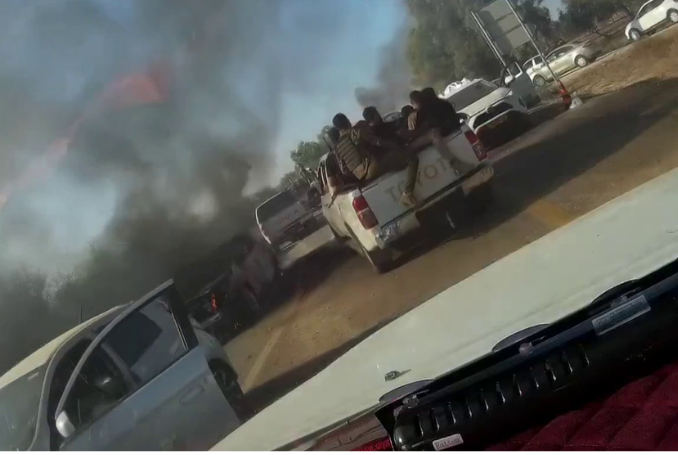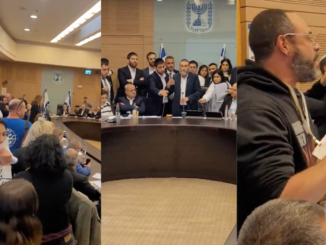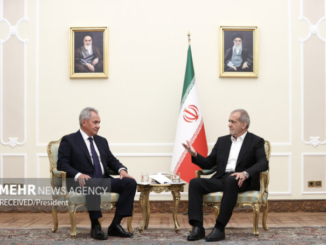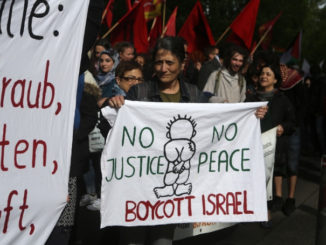
By Benay Blend
None of these issues could be resolved through using only a rights approach, as there are very few human rights guaranteed to a population under occupation.
On July 17, 2024, Human Rights Watch (HRW) issued a report that holds Palestinian armed groups responsible for alleged war crimes committed on October 7.
Many of the charges have been rebutted several times, so only a mention needs to be repeated here. What appears significant about this document is that it illustrates the limits of HRW’s human rights approach as opposed to studies that focus on decolonization of the Zionist regime.
In “Decolonisation and the Case of Palestine,” Eleyan Sawafta puts October 7 within a historical context, a process that HRW ignored in their report. Rarely does the document mention the occupation, and when it does it is within the framework of an “ongoing armed conflict,” not the ongoing subjugation of one group by another.
“Any understanding of the context of the situation should start or end with decolonisation,” Sawafta writes, “because Israel has been a settler-colonial regime from its creation in 1948.” Such a process requires “a wide historical lens encompassing global struggles for freedom as well as the enduring complexities of Israel as a settler-colonial, apartheid and occupation state.”
No liberation movement in history has proved successful without armed struggle, whether in Africa, Latin America, or the Middle East. Placing “Israel within the framework of settler-colonialism linked with other imperialist-colonialist entities” makes this clear, Sawafta claims, and, in turn, situates Palestine within a global “struggle for humanity.”
“There is no magic to resistance and struggle,” writes human rights lawyer Stanley Cohen. “They transcend time and place and derive their very meaning and ardour in the natural inclination, indeed, drive, of us all to be free – to be free to determine the role of our own lives.”
“In Palestine, no such freedom exists,” he continues. “In Palestine, international law recognises the fundamental rights to self-determination, freedom and independence for the occupied. In Palestine, that includes the right to armed struggle, if necessary.”
In an interview with the Intercept’s Jeremy Scahill, Palestinian human rights lawyer Diana Buttu explains how “we have to start thinking in terms of decolonization.” Significantly, Buttu stresses that this is not the problem of one individual, namely Netanyahu, but rather that of “Israeli” society as a whole.
“Inside Israeli society today, you see an appetite,” she explains. “You see that there is nobody willing to stop this genocide.” As for the future, Buttu says that she is unwilling to talk about an aftermath before the genocide is over.
Nevertheless, she draws lessons from South Africa, where apartheid ended “without ever really addressing the root causes of it, we see that, today, that South Africa is still one of these places where there’s such an unjust distribution of resources.”
“Looking at Palestine,” she continues, “I think that we have to start thinking in terms of decolonization.” Given that the Nakba was not so long ago, Buttu stresses that “there has to be a process of decolonizing the place,” including the dismantling of the Zionist state, which in turn would give Palestinians their proper citizenship and allow those in the diaspora to return.
None of these issues could be resolved through using only a rights approach, as there are very few human rights guaranteed to a population under occupation.
As Jeremy Scahill makes clear, along with decolonization, “Israelis have to be made aware that what Israel’s doing is not normal, that this is not the actions of a normal state,” and that requires an education process that has yet to happen.
Mainstream news very quickly picked up the story. For example, CNN repeated several of the “facts” in the HRW report, including the charges of sexual and gender-based violence that have since been proven false.
Moreover, CNN does not mention the Haaretz report that documented how the “Israeli” army ordered the activation of the Hannibal Procedure, which included the killing of both detainees and their captors on October 7.
Finally, the article concluded with a quote by Ida Sawyer, crisis and conflict director at HRW. “Atrocities do not justify atrocities,” conceded Sawyer. “To stop the endless cycle of abuses in Israel and Palestine, it’s critical to address root causes and hold violators of grave crimes to account. That’s in the interests of both Palestinians and Israelis.”
Rather than a “cycle of violence,” which implies equal moral weight as well as military strength between both sides, the relationship between “Israel” and Palestine has been that of occupied and occupier, with the latter carrying out a program of ethnic cleansing since the establishment of the Zionist state in ’48.
Moreover, the report does not address “root causes,” such as the Nakba of 1948 followed by 76 years of daily Nakbas that have subjugated all Palestinians to various degrees of control. What this report does is continue the practice of what Mary Turfah calls “atrocity propaganda,” stories that the “Israeli” hasbara (propaganda) machine has propagated to justify the genocide in Gaza.
In “Palestine Studies, Knowledge Production, and the Struggle for Decolonisation,” Ilan Pappé, Tariq Dana, and Nadia Nassar-Najjab discuss the ways that mainstream media and academia fail to provide the historical context for current events on the ground, much in the way that the HRW report takes October 7 out of context. This silencing of Palestinian perspectives has a long history, which makes documents like this one more pernicious as there is very little public information to counter it.
“The picture is that of a colonized people fighting for survival, at a time when its oppressors had elected a government, which is hellbent on accelerating the destruction, in fact the elimination of the Palestinian people – or even their very claim to peoplehood,” Pappé writes in another article.
Given this situation, he concludes that “Hamas had to act, and quickly so,” but it was hard to make this heard because Western politicians and the media “went along with the Israeli discourse, and the narrative, however problematic it was.”
For those who knew that October 7 did not happen in a vacuum, but rather against the sealing off of the Gaza Strip by “Israel” since 2007, along with the murder and imprisonment of Palestinians in the West Bank, then actions by the resistance took on a different meaning than that presented by HRW.
In “Some Lessons Learned about Zionism and Anti-Zionism from an Ongoing Genocide,” activist/scholar Steven Salaita explains that “Palestinians have behaved as all communities facing extinction behave,” thereby putting October 7 into a global/historical context.
Those who did not do this—and this includes HRW—might have self-identified as anti-Zionist but still repeated “Israeli” atrocity propaganda, while “real anti-Zionists” knew better. As a consequence, Salaita describes a rupture “between the radical and accommodationist wings of the Palestine solidarity movement,” a division that he claims is useful.
Salaita concludes that “if anything liberal Zionism—in the form of electoralism, movement building among social democrats, overemphasis on Israeli anguish, and appeals to dialogue—is doubly onerous because it requires the anti-Zionist to expend energy on supposedly friendly in addition to openly hostile spaces.”
As self-described progressive politicians, human rights groups, and so on continue the work of liberal Zionists, hedging their comments by “condemning Hamas (or Palestinian ‘violence’); reciting Israeli government talking points; berating Palestinians on behalf of Democratic politicians; humoring cynical accusations of “antisemitism”; earning a platform in the first place,” they are easily flushed out, even when ostensibly calling out for human rights.

– Benay Blend earned her doctorate in American Studies from the University of New Mexico. Her scholarly works include Douglas Vakoch and Sam Mickey, Eds. (2017), “’Neither Homeland Nor Exile are Words’: ‘Situated Knowledge’ in the Works of Palestinian and Native American Writers”. She contributed this article to The Palestine Chronicle.








Thank you so much for this, such an important perspective. South Africa is too often and falsely invoked as a ‘success story’ for a one-state solution, whereas Buttu correctly points out the failure of liberation in the reduction of the South African case to one of human rights during our so-called “transition period”. The Palestinians must be very very wary of this trap. Just as the ANC was Co-opted here, the same will happen with the PA and other reactionary forces who will negotiate away true liberation.